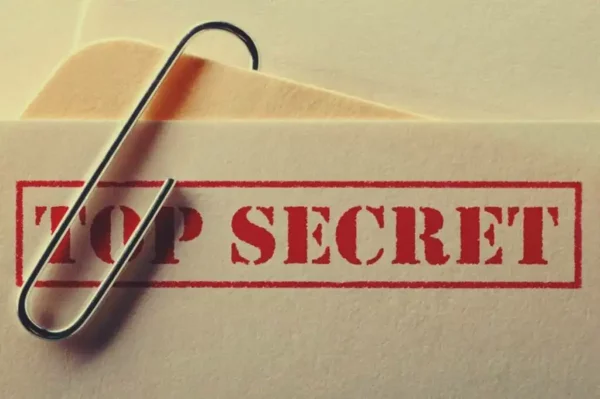Secrets and Lies


Written and verified by the psychologist Sergio De Dios González
Let’s face it, to a greater or lesser extent, we all tell lies and keep secrets. It’s not something to be proud of but it’s an undeniable part of human nature.
From the child who fakes crying because they need attention from their parents to swindlers like Bernie Madoff, at any age and on any scale, lying is a part of our lives. However, where does this impulse to deceive or hide the truth come from?
Could it be an unconscious drive? A repressed desire to be as your lies describe you or the world around you?
Whatever the case, it seems that lying fulfills a double social function. Firstly, to present yourself and the world as you want it to be. Secondly, to manipulate others.

A treacherous web of secrets and lies
According to research, strangers lie to each other around 300 times in the first ten minutes of meeting each other. This data, although it seems shocking, isn’t so surprising if you take into account that lies are a bridge between your fantasies about what you’d like to be, and what you really are. In fact, by inventing certain facts about yourself, you feel that you fill a void with certain qualities or things that’d make you feel more valuable.
Researchers also claim that you tell between 100 and 200 lies a day. Add to that the fact that you’re inundated on a daily basis with spam, false digital friends, identity thieves, and scammers of all kinds, the picture is less than flattering. In fact, it creates a picture of a hostile environment from which you must protect yourself to avoid falling prey to amateur and professional liars. Lies in which you’re also a participant in certain ways.
Little white lies
Not all lies are destructive. There are also the so-called ‘white lies’ which you use to protect other people and avoid hurting their feelings. For example, when you receive a gift that you don’t like, and you pretend otherwise to avoid upsetting the person who’s been so generous to you.
Another poignant example of a white lie is the movie, Life is Beautiful, in which, in the midst of the Holocaust, a father makes his young son believe that all the people in a concentration camp are participating in a fun game, just to protect him from suffering.

Secrets
Secrets might be kept to avoid damaging a person’s reputation or to avoid revealing painful information. For example, a mother who spares her children details about conflicts or arguments between her and her husband which would be painful for them if they found out.
However, there are other secrets that, although knowing them may prove painful, must be revealed. This is usually because the person is going to find out sooner or later, or because they simply have the right to know. Such is the case of adopted children or when a person is suffering from a serious illness. In these circumstances, it’s important to prepare the person and be extremely careful in how the information is disclosed, so as not to cause more of an impact than necessary.
Lies can often create a web in which you can easily become entangled. Indeed, they have a destructive power capable of seriously damaging relationships and wreaking havoc on others’ lives. Although white lies are sometimes necessary in the real world, living in a world of lies in order to appear to be something you’re not or to manipulate others, has a boomerang effect in the long run. That’s because nothing stays hidden forever under the penetrating rays of the sun.
Let’s face it, to a greater or lesser extent, we all tell lies and keep secrets. It’s not something to be proud of but it’s an undeniable part of human nature.
From the child who fakes crying because they need attention from their parents to swindlers like Bernie Madoff, at any age and on any scale, lying is a part of our lives. However, where does this impulse to deceive or hide the truth come from?
Could it be an unconscious drive? A repressed desire to be as your lies describe you or the world around you?
Whatever the case, it seems that lying fulfills a double social function. Firstly, to present yourself and the world as you want it to be. Secondly, to manipulate others.

A treacherous web of secrets and lies
According to research, strangers lie to each other around 300 times in the first ten minutes of meeting each other. This data, although it seems shocking, isn’t so surprising if you take into account that lies are a bridge between your fantasies about what you’d like to be, and what you really are. In fact, by inventing certain facts about yourself, you feel that you fill a void with certain qualities or things that’d make you feel more valuable.
Researchers also claim that you tell between 100 and 200 lies a day. Add to that the fact that you’re inundated on a daily basis with spam, false digital friends, identity thieves, and scammers of all kinds, the picture is less than flattering. In fact, it creates a picture of a hostile environment from which you must protect yourself to avoid falling prey to amateur and professional liars. Lies in which you’re also a participant in certain ways.
Little white lies
Not all lies are destructive. There are also the so-called ‘white lies’ which you use to protect other people and avoid hurting their feelings. For example, when you receive a gift that you don’t like, and you pretend otherwise to avoid upsetting the person who’s been so generous to you.
Another poignant example of a white lie is the movie, Life is Beautiful, in which, in the midst of the Holocaust, a father makes his young son believe that all the people in a concentration camp are participating in a fun game, just to protect him from suffering.

Secrets
Secrets might be kept to avoid damaging a person’s reputation or to avoid revealing painful information. For example, a mother who spares her children details about conflicts or arguments between her and her husband which would be painful for them if they found out.
However, there are other secrets that, although knowing them may prove painful, must be revealed. This is usually because the person is going to find out sooner or later, or because they simply have the right to know. Such is the case of adopted children or when a person is suffering from a serious illness. In these circumstances, it’s important to prepare the person and be extremely careful in how the information is disclosed, so as not to cause more of an impact than necessary.
Lies can often create a web in which you can easily become entangled. Indeed, they have a destructive power capable of seriously damaging relationships and wreaking havoc on others’ lives. Although white lies are sometimes necessary in the real world, living in a world of lies in order to appear to be something you’re not or to manipulate others, has a boomerang effect in the long run. That’s because nothing stays hidden forever under the penetrating rays of the sun.
This text is provided for informational purposes only and does not replace consultation with a professional. If in doubt, consult your specialist.







